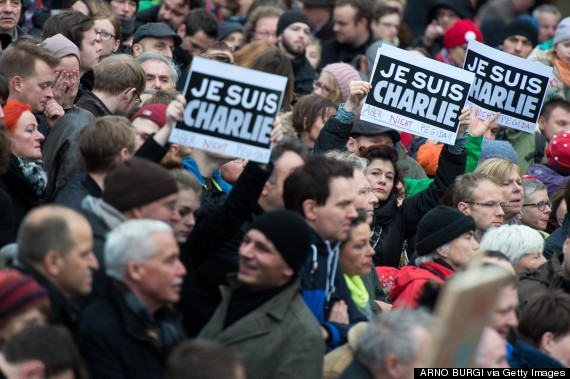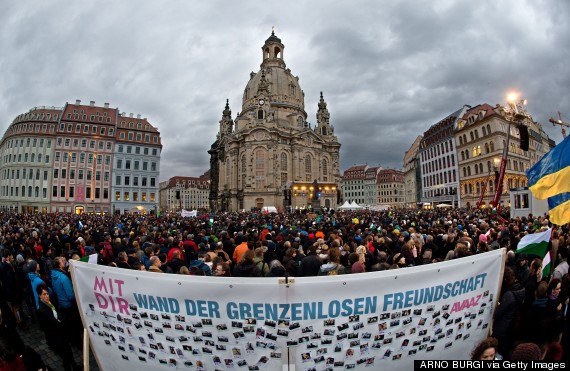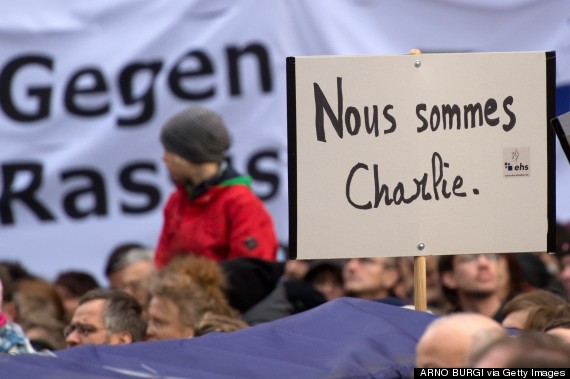BY DAVID HOROVITZ
Op-ed: It is Europe’s free press, its freedom of expression, and thus its very civilization, that the Islamists behind the Paris attack seek to destroy. Only if the West internalizes the scale of the threat will it stand a chance of vanquishing it
Speaking to Israeli television from Paris on Wednesday night, hours after gunmen shouting “Allahu Akbar” had shot dead 12 people at the offices of the “Charlie Hebdo” satirical magazine, the French-Jewish parliamentarian Meyer Habib called the massacre France’s 9/11.
When Islamist killers targeted Jews in Toulouse in 2012 and Brussels last year,
Habib recalled, “we warned that this would come to all of France. And to our sorrow it came…. We are in a fight,” he elaborated, “against jihadism, against this darkness.”
After four British-raised Muslims killed 52 civilians and injured 700 in coordinated bombings in London on July 7, 2005, numerous commentators and analysts likened that assault, too, to the Al-Qaeda attacks on America in 2001. But if that was Britain’s 9/11, it didn’t bring sufficient clarity of thought to the struggle against Islamist terrorism. It didn’t open enough eyes. Too many Britons, including too many leaders and policymakers, preferred a mixture of stoicism and denial to the imperative of rigorously confronting Islamic extremism. Too many preferred to blame prime minister Tony Blair for ostensibly inviting that day’s murders, including through his purportedly over-cozy relationship with the reviled George W. Bush and his backing of Israel. That was all far more convenient than acknowledging that Britain had a colossal problem with homegrown Islamic extremism, whipped up by British-based Islamic spiritual (mis)leaders. Almost a decade later, Britain has still failed to adequately tackle the rise of Islamist extremism at home, with a consequent stream of plots and attacks, and a flow of misguided young Muslims joining the ranks of Islamic State in Iraq and Syria.
The question is whether France, Britain and the rest of Europe, in the aftermath of Wednesday’s assault — a more calculated and specific attack than the indiscriminate murders in London — will now muster a more energetic, coordinated and effective response.
Islamist terrorism must be faced down determinedly whenever and wherever it threatens to strike. But it must all be addressed far earlier in the process, where its potential perpetrators are inspired and recruited
The struggle has to be waged at two levels — and Europe, thus far, has been failing in both.
As my colleague Avi Issacharoff notes, the task of tracking the thousands of IS recruits who travel to the Middle East and back, and are all too demonstrably ready to murder “infidels” at home and abroad, is a nightmare mission for the intelligence agencies. But it becomes an impossible one unless, simultaneously, the process by which these killers are indoctrinated is tackled too. Islamist terrorism, that is, must be faced down determinedly whenever and wherever it threatens to strike. But it must all be addressed far earlier in the process, when its potential perpetrators are “inspired” and recruited.
In the Middle East, the US is currently leading a coalition trying to counter territorial advances by Islamic State in Iraq and Syria. Israel is relentlessly battling the Islamist terrorists of Hamas in Gaza and in the West Bank, and knows that it must anticipate further rounds of conflict there and with Hezbollah in southern Lebanon. But far too little effort has been devoted, in the Middle East, to dealing with those school systems, media and internet outlets, and religious leaders that are poisoning the minds of young Muslims — the impressionable children who grow up into the IS and Hamas suicide bombers and beheaders and masked gunmen of tomorrow. In Europe, too, pernicious spiritual leaders are too often allowed to preach hatred untroubled by the authorities; institutes of supposed higher education play host to extremist groupings; internet sites peddle unbridled hatred.
Increasing numbers of Jews in France are gradually concluding that there is no future for them there anymore; hence the rising number of French immigrants to Israel. In a moment of startlingly soul-baring candor from a highly successful British Jew, the director of BBC Television,
Danny Cohen, vouchsafed in an interview in Jerusalem last month that “I’ve never felt so uncomfortable being a Jew in the UK as I’ve felt in the last 12 months. And it’s made me think about, you know, is it our long-term home, actually… You’ve seen the number of attacks rise. You’ve seen murders in France. You’ve seen murders in Belgium. It’s been pretty grim actually. And having lived all my life in the UK, I’ve never felt as I do now about anti-Semitism in Europe.” For the first time since the World War II era, when Israel was revived too tragically late to save the six million, this country is becoming seen as a necessary refuge for a growing number of fearful European Jews.
But the Islamist agenda is by no means limited to Jews and to the Jewish state. As Habib observed on Wednesday night, the jihadists “want to destroy all the infrastructure of France.” If the London bombings were a case of indiscriminate terrorism, Wednesday’s Paris atrocity was a calculated assault on free speech — the targeting of a publication that caricatured the Prophet Mohammed, dared to mock a deity. There are limits to satire and mockery, limits to freedom of expression, but Western civilization provides legal frameworks in which to weigh and enforce those limits. Islamic extremism allows for no such humor, no such mockery, no such tolerance. It is Europe’s free press, its freedom of expression, its very civilization, then, that was attacked Wednesday, that the Islamists seek to destroy. The stakes could not be higher.
The fight back is anything but simple, in large part because of the West’s insistent freedoms. That’s what tyranny and extremism do — they exploit freedom to engineer its downfall. They take advantage of open borders and tolerant legislation and earnest judicial procedures to travel unrestricted, to preach hatred, to arm and train, and ultimately to kill. The counter-struggle necessitates confronting extremist hierarchies all the way from the first sermon or Facebook post to the attempt at murder; it also necessitates empowering humane, tolerant elements, again, in education, media and religious leadership. It requires effective law enforcement at the most local, grassroots level. But it also requires Western nations to reorient their foreign policies at the highest levels, to reassess diplomatic relations with those countries that maintain educational systems and spiritual leaderships which breed Islamist intolerance and violence, and to use all the diplomatic and economic leverage they can muster to marginalize those dangers and to bolster more moderate forces.
Can Europe yet save itself? Can Islamic extremism be defeated? Not easily. But the necessary first step is acknowledging the extent of the problem and the challenge. Or, as Habib put in Wednesday, first “we have to open our eyes.”
Read more: The first step toward defeating Islamist terrorism | The Times of Israel http://www.timesofisrael.com/the-first-step-toward-defeating-islamist-terrorism/#ixzz3OSN8Z7V5
Follow us: @timesofisrael on Twitter | timesofisrael on Facebook




 A banner reading 'Wall of friendship without borders' can be seen in the foreground as thousands of people take part in a rally on January 10, 2015 in Dresden, eastern Germany. (ARNO BURGI/AFP/Getty Images)
A banner reading 'Wall of friendship without borders' can be seen in the foreground as thousands of people take part in a rally on January 10, 2015 in Dresden, eastern Germany. (ARNO BURGI/AFP/Getty Images)





